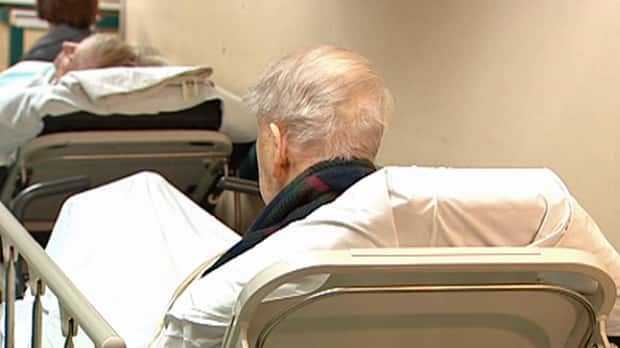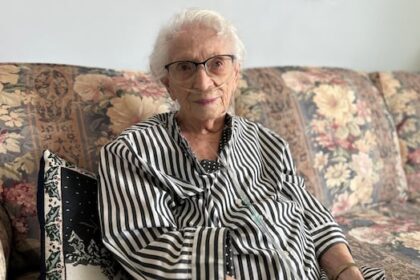The number of Horizon hospital beds occupied by people awaiting long-term care has reached a record high, pushing occupancy rates to crisis levels, officials warned Thursday.And the situation is only expected to get worse with an “imminent surge” of ER visits and hospital admissions during the respiratory season, Greg Doiron, vice-president of clinical operations, told the quarterly board meeting in Fredericton.Horizon has struggled for years with so-called alternate level of care, or ALC patients languishing in hospital beds while they wait for a nursing home or special care home bed, or in-home services.Last month, the board asked the executive leadership team to come up with solutions to try to get ahead of the capacity challenges before the peak respiratory season.Only 10 Fredericton ER beds availableTo illustrate the current impact ALC patients are having, Doiron cited the example of the Dr. Everett Chalmers Regional Hospital in Fredericton, where only 10 of 30 emergency beds were available, as of Thursday. “That’s if you come in with a heart attack or a broken arm,” he said.The remaining 20 were occupied by patients who had been admitted to hospital but were waiting for a bed because they were all occupied.About 42 per cent of beds at the Chalmers Hospital — 40 per cent Horizon-wide — are occupied by ALC patients, Doiron said. Sometimes the space they’re going to is a hallway, a storage room, an office with no bathroom, no privacy, no dignity.- Greg Doiron, Horizon’s vice-president of clinical operationsSome admitted ER patients will wait up to two days for a hospital bed — which isn’t always in a room, Doiron said.”Sometimes the space they’re going to is a hallway, a storage room, an office with no bathroom, no privacy, no dignity, and ultimately no ability for them to benefit from the environments they need to be able to properly heal, both physically, emotionally and spiritually,” he said.711 occupied beds projected by Christmas”This is because our system is currently crippled by the fact that we have nearly 650 patients across our entire system who currently occupy a bed as a medically discharged patient.”Horizon has opened 190 “unfunded” beds to try to alleviate the pressure, with existing nurses, housekeeping staff, pharmacists and physiotherapists doing extra work, adding to burnout and morale problems, and adding more than $14 million to the deficit, the board heard.Still, the number of ALC patients is expected to climb to 711 by Christmas, or 41 per cent of acute care beds, “just based on our normal rate of growth,” Doiron said.After that, “unfortunately, it gets worse,” he said, referring to anticipated cases of the flu, COVID-19 and respiratory syncytial virus, or RSV.”So you can imagine the concern we have as an organization when we consider what we are preparing against, when we are looking at the highest rate of ALC we’ve ever seen as an organization.”‘We are collectively failing these patients'”We are indeed in the midst of a crisis with respect to hospital occupancy,” said board chair Susan Harley.The optimal hospital occupancy is 85 per cent, she said, but Horizon is currently operating at 107 per cent.”Bottom line, we are collectively failing these patients and that’s not acceptable,” Harley said.”Until we as a province address this situation with needed solutions, we will continue to have crowded emergency departments, challenges to surgery, wait times and patients waiting in hallways once they’ve been admitted.”Plans underwayAmong the plans Horizon has underway is to enable medically stable patients to return home safely where they’ll receive the care they need while they’re waiting to be assessed for long-term care, Doiron said.A total of 167 patients are currently waiting to be assessed — about 26 per cent of all patients who are medically discharged.”We’re anticipating we can get to below 65 as a result of this strategy,” which is expected to be launched imminently in Fredericton, followed by Saint John in December and Moncton and Miramichi in early 2026.An emergency department diversion program will see a navigator and allied health resources help prevent hospital admissions, and for those who are admitted, earlier intervention and rehab, Doiron said.It should be rolled out by the end of the month and is expected to decrease the number of admissions by as many as 500 patients per year, he said.The plan also includes expansion of the long-term care assessment pilot at the Chalmers hospital to include the Saint John Regional Hospital and the Moncton Hospital, Doiron said.Greg Doiron, vice-president of clinical operations for Horizon, presented to the board Thursday in Fredericton. (CBC)Under the pilot, hospital nurses, social workers and discharge planners conduct the assessments for ALC patients, rather than Social Development employees.It has shortened the wait time for an assessment and provided patients with faster access to a long-term care bed, if one is available.”Once we know where they need to go, we can then start working with our partners to get them there,” Doiron said.Worries about dealing with multiple traumasThe last piece of the plan “is truly the last straw, so to speak — a bed crisis plan,” he said.”In order to create more beds … we will have to close services in hospital and transfer them to the community, we will have to create beds where none exist today.”Locations for “crisis patient spaces” have been identified in Saint John, Miramichi and Moncton and renovations are underway. The search for Fredericton locations continues.At the Chalmers hospital, the surge policy will kick in when the 30-bed ER hits a three-day average of having 27 admitted patients, Doiron said.”The reason why we’re keeping it at 27 is because we will always have a bed available when that trauma patient comes in.”The thing that keeps me awake at night is what happens if two traumas come?”What happens if it’s a catastrophic accident, right? Those are the times where we just don’t have what we need to be able to do that, and respiratory season is what many of our team call a slow-moving catastrophe.”CEO calls for urgent helpPresident and CEO Margaret Melanson said Horizon urgently needs increased capacity in both nursing homes and home care.”We have not yet seen significant improvement on this matter and the impact of this issue is being felt across every level of our acute-care system,” she said.”Hospitals are designed to provide acute care, not to serve as long-term residences.”The Department of Health and Social Development did not immediately respond to a request for comment.
Horizon treats patients in hallways, storage rooms as record-high beds occupied by long-term care patients











